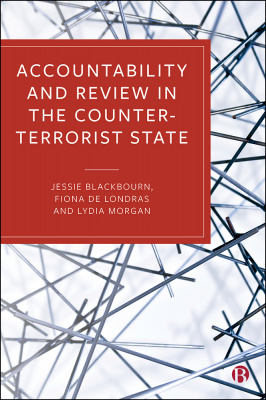 We are delighted that the book of this project, Accountability and Review in the Counter-Terrorist State is now available on general sale from Bristol University Press. In this book we bring together some of the critical findings from our research, which encompassed desk reviews, policy review, two dozen elite interviews, and a stakeholder workshop. Over the coming week or so, we will publish a series of blog posts here on the project website outlining some of our key arguments and findings.
We are delighted that the book of this project, Accountability and Review in the Counter-Terrorist State is now available on general sale from Bristol University Press. In this book we bring together some of the critical findings from our research, which encompassed desk reviews, policy review, two dozen elite interviews, and a stakeholder workshop. Over the coming week or so, we will publish a series of blog posts here on the project website outlining some of our key arguments and findings.
Throughout the book and, indeed, throughout the project, our starting proposition was that giving effect to accountability as a constitutional expectation of legitimate government is challenging in the counter-terrorist state, but that counter-terrorism review may operate as a ‘web of accountability’ that assists us in meeting that challenge. In the book we develop this argument through four key stages.
First, we argue that the UK should now be understood as a counter-terrorist state. That is, a state in which counter-terrorism law, policy, discourse and operations are mainstreamed across the domains of law and government in forms that are conceptualised and designed as ‘permanent’ in at least some cases; in which non-state actors are responsibilised for counter-terrorism; and in which all persons are the subjects of counter-terrorism, although not necessarily equally attended to by state and non-state counter-terrorism power. If counter-terrorism is now normal, it is important to consider critically whether political and legal behaviours and expectations have shifted accordingly to re-establish accountability in the counter-terrorist state.
Second, we focus on two case studies—Prevent and TPIMs—to analyse the relevant legislation, parliamentary debates, litigation, review outputs, regulatory practice, and civil society reports to explore whether, when, how, and against which evaluative standards counter-terrorism review operates in the UK. We show that in some cases, what could operate as counter-terrorism review in fact operates only as reporting, information provision, or compliance monitoring (if not enforcement). Where evaluative review does take place, it is often focused on operational and legal questions, rather than questions of unforeseen and societal impacts, although less so where civil society undertakes the review.
Thirdly, we report the findings from our interviews on how actors within the counter-terrorism review assemblage perceive review, undertake review, and operate in relation to one another. Our analysis reveals that while counter-terrorism review can operate reasonably well to evaluate counter-terrorism, much of that is dependent on goods that only the Government can disperse (like access to security cleared information, or perceived political credibility) or which Government largely controls (like the allocation of parliamentary time), and on an informal division of labour within the assemblage, although that too can be disrupted or hampered by the imposition of intra-assemblage hierarchy and status by Government action.
Fourthly, we argue that the persistence of state secrecy, the abundance of Executive control over review and the conditions of review, the limitations of Parliament as the ultimate accountability forum, and the absence of trust within the counter-terrorist state are all structural factors that have an enduring, limiting impact on the counter-terrorsm review assemblage’s capacity for success.
This is adapted from the Introduction to Accountability and Review in the Counter-Terrorist State
